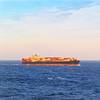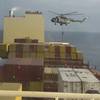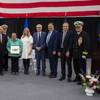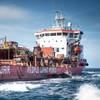ClassNK Chairman & President Noboru Ueda revealed that ClassNK, already the world’s largest on a gross ton basis, aimed to have more than 200 million gross tons on its register by the end of 2013 as part of the Society’s new “Global Approach 200” mid-term plan, unveiled in Tokyo today. The plan was officially revealed to the press today following its approval by the ClassNK Administrative Council, which met for the first time since the Society completed its transition to a new legal structure in April of this year.
The “Global Approach 200” plan, the first such mid-term plan to be released by ClassNK, lays out 3 key strategic objectives for the society for the period between 2011 to 2013, including: creating a stable foundation resistant to changes in the market environment, maintaining ClassNK’s position as the world’s leading classification society and expanding upon its share of the classification market, and taking more a proactive approach to new opportunities. Based on these strategic objectives, Mr. Ueda laid out 5 goals for the class society to achieve by 2013, including: establishing a stable financial foundation for future growth, reaching more than 200 million gross tons on its register, improving the quality of its services and increasing its global presence, expanding its business operations, and promoting new research and development.
The announcement of the midterm plan follows ClassNK’s transition from an incorporated foundation (zaidan houjin)to a general incorporated foundation (ippan zaidan houjin) in line with recent amendments to Japanese law. As a result of the legal transition, which was completed on April 1 of this year, ClassNK has gained a wider range of operational flexibility, including the ability to establish subsidiary entities, as well as invest in new enterprises.
ClassNK Chairman & President Noboru Ueda addressed the change by saying: “As the maritime industry has grown and changed, classification societies have been called upon to play an ever greater role to address the demands of new regulation. Yet even as we have strived to better serve the needs of the growing maritime industry, some of our efforts were held in check by the rigid nature of our charter and existing regulations.”
“With this transition, however, we now have greater freedom to develop new services and meet the changing needs of the maritime industry, while maintaining our status as a wholly independent, non-profit organization.”
When asked which areas the Society would expand into, Mr. Ueda cited IT, R&D, and training services, as well as increased support and expanded services for new treaties and conventions as key areas for the future, adding: “As the world’s largest classification society, I believe we can play a greater role in the development of new technical regulations, both independently and at IACS and the IMO, while also providing the maritime community with the tools and skills necessary to meet the ever greater demands being placed upon our industry.”
“In doing so, we can expand our mission beyond just ensuring the safety of life and property at sea and the protection of the marine environment, and more actively contribute to the ongoing development and continued success of the greater maritime industry.”
















